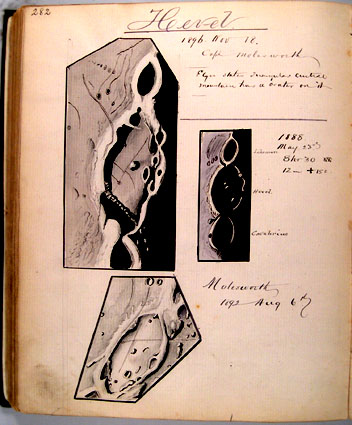Difference between revisions of "June 17, 2008"
| (2 intermediate revisions by the same user not shown) | |||
| Line 6: | Line 6: | ||
<em>image by Chuck Wood of diary at Lunar & Planetary Institute, Houston</em><br /> | <em>image by Chuck Wood of diary at Lunar & Planetary Institute, Houston</em><br /> | ||
<br /> | <br /> | ||
| − | <em>A very busy night with another proposal due tomorrow, so re-enjoy an [ | + | <em>A very busy night with another proposal due tomorrow, so re-enjoy an [[September_1,_2004|earlier]] LPOD masterpiece!</em><br /> |
<br /> | <br /> | ||
| − | With our multi-hundred dollar eyepieces, goto telescopes, electronic cameras and clever software we see and record the Moon better than ever before. Oh yeah? Compare the top left drawing of Hevel (the name before latinization gentrified it to Hevelius), made in 1896 by one Capt. Molesworth, with your own observations. Have you seen the crossing rilles on the crater floor? The very best telescopic [ | + | With our multi-hundred dollar eyepieces, goto telescopes, electronic cameras and clever software we see and record the Moon better than ever before. Oh yeah? Compare the top left drawing of Hevel (the name before latinization gentrified it to Hevelius), made in 1896 by one Capt. Molesworth, with your own observations. Have you seen the crossing rilles on the crater floor? The very best telescopic [[May_6,_2004|image]] ever of Hevelius confirms the Capt's discovery and does show some additional rilles. We should not ignore the work of old time observers. Some had excellent telescopes, sharp eyes and good drafting skills. What we do have now that they didn't is a good understanding of the geologic processes that made the lunar landscapes we study. Today's LPOD is another page from the 1890s lunar [[April_19,_2004|diary]] of Walter Goodacre.<br /> |
<br /> | <br /> | ||
<em>Chuck Wood</em><br /> | <em>Chuck Wood</em><br /> | ||
| Line 16: | Line 16: | ||
<br /> | <br /> | ||
<br /> | <br /> | ||
| − | |||
| − | |||
<hr /> | <hr /> | ||
<strong>COMMENTS</strong><br /> | <strong>COMMENTS</strong><br /> | ||
| − | |||
| − | |||
| − | |||
| − | |||
<br /> | <br /> | ||
<!-- Removed reference to store page 2 --> | <!-- Removed reference to store page 2 --> | ||
| + | <p><b>Yesterday's LPOD:</b> [[June 16, 2008|A Lunar Process]] </p> | ||
| + | <p><b>Tomorrow's LPOD:</b> [[June 18, 2008|Wrinkle Tales]] </p> | ||
<!-- End of content --> | <!-- End of content --> | ||
{{wiki/ArticleFooter}} | {{wiki/ArticleFooter}} | ||
Latest revision as of 22:17, 22 March 2015
Hundred Year Old Hevel

image by Chuck Wood of diary at Lunar & Planetary Institute, Houston
A very busy night with another proposal due tomorrow, so re-enjoy an earlier LPOD masterpiece!
With our multi-hundred dollar eyepieces, goto telescopes, electronic cameras and clever software we see and record the Moon better than ever before. Oh yeah? Compare the top left drawing of Hevel (the name before latinization gentrified it to Hevelius), made in 1896 by one Capt. Molesworth, with your own observations. Have you seen the crossing rilles on the crater floor? The very best telescopic image ever of Hevelius confirms the Capt's discovery and does show some additional rilles. We should not ignore the work of old time observers. Some had excellent telescopes, sharp eyes and good drafting skills. What we do have now that they didn't is a good understanding of the geologic processes that made the lunar landscapes we study. Today's LPOD is another page from the 1890s lunar diary of Walter Goodacre.
Chuck Wood
Related Links
Rükl plate 28
COMMENTS
Yesterday's LPOD: A Lunar Process
Tomorrow's LPOD: Wrinkle Tales
COMMENTS?
Register, Log in, and join in the comments.



